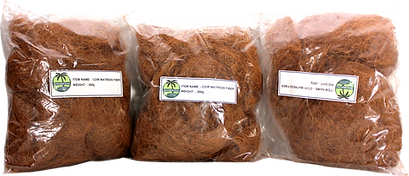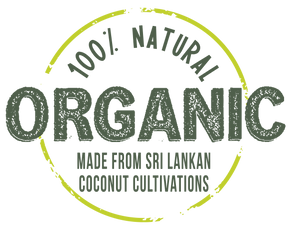

Knowledge
Coconut husks


Coconut husks are the fibrous outer layer of the coconut. Our product range is primarily made from husks that are 100% organic, biodegradable and eco-friendly.
-
Husks are 100% natural organic growing medium which gives a higher volume when compressed.
-
High Expandability of Compressed Cocopeat Briquettes.
-
Briquettes are made out of Coconut husks cut into small pieces of 1cm-4cm, dried and compressed into a handy retail pack for home gardening, horticulture, floriculture etc.,
-
Can be mixed with sand, compost and fertilizer to make good quality potting soil
-
Helps to keep the soil loose and airy that helps in better root growing
-
Dry husk chips are extremely hydrophilic and quickly absorb water making them easy to use.
-
Husks and Coco peat contain a natural genus of fungi that acts as a Bio agent against harmful pathogens.
-
High porosity and high water holding capacity.
-
No chemicals added and no disposal problems as it is 100% biodegradable.
Also available in 620g & 650g Briquettes or custom sizes too.
Specially produced for retail markets, for home gardening and hobby growers, and all horticulture and hydroponic industries as a potting mixture or a soil conditioner. Husk chips (Coir Mulch) produced from the husks at the outer layer of coconut consist of long fibres and sponge-like pith particles. Coconut husk chips are superior for hydro absorption and water distribution. Coconut husk chips are one of the best soil conditioners found in the growing world bearing a higher water holding capacity (10 times its weight). This is ideal to retain moisture in the soil during hot summers.
.png)
Coconut fibre
Coconut fibre (Coco fibre) is extracted from the fibrous outer layers of coconuts. Coco fibre is graded/or differentiated based on maturity, colour and length of the clean fibre.
The Process
Coco fibres improve the capillary action of the growing medium. For this reason, they have to satisfy a number of requirements, e.g. in terms of length, thickness and EC. We remove the fibres by decorticating, beating or de-fibring the husks. We then select them on the basis of thickness, as fibres that are too thin decompose at a faster rate and therefore lose their effect too quickly. The fibre that we remove from the husk is excellent for use in growing media.


.png)
.png)

Coco peat
Cocopeat is a multi-purpose growing medium made out of coconut husks. The fibrous coconut husk is pre-washed, machine dried, sieved and made free from sand and other contaminations such as animal and plant residue.
Cocopeat is a very good alternative to traditional peat moss and Rock Wool. Its air-filled porosity and high water holding capacity make it, an ideal growing medium for plant crops. It is 100% organic and eco friendly, free from soil-borne pathogens and weeds. It has a pH of 5.7 – 6.5, EC level <1 mS/cm is ideal for plant growth.
How Cocopeat is extracted
All our products are based on Coconut husks. By using a variety of processing methods, we produce three materials: Coco peat, Coco chips and Coco fibre.
Once the husks have been received in our production plants they are stored centrally for at least six weeks, after which further processing can begin. The husks are beaten or decorticated to remove the fibres, which leaves us with Coco peat. The Coco peat is transported to our storage bunkers immediately after the fibres have been removed. There it is stored and so begins the ageing process in which the Coco peat is stabilised. This process takes at least four months. Once it is over, we sieve the Coco peat to remove the last remaining fibres. The Coco peat is then dried and taken to the pressing shop, where it is compressed into blocks and briquettes.
Cleaning & Purifying
After sieving, Coco peat is further treated and washed. Elements that are freely soluble in water, such as potassium, sodium and chloride, are removed. The salt content is reduced to an EC < 1.0 mS/cm [1:1.5 water extraction method]. In addition to this, we can also buffer the coco peat. During this process, calcium [2+] is introduced in order to remove monovalent positive ions such as potassium [1+] from the coconut complex. In this way, we remove not only elements that are soluble in water but also elements that are bound to the coconut complex. Washing and buffering is done in our own coconut fields.




